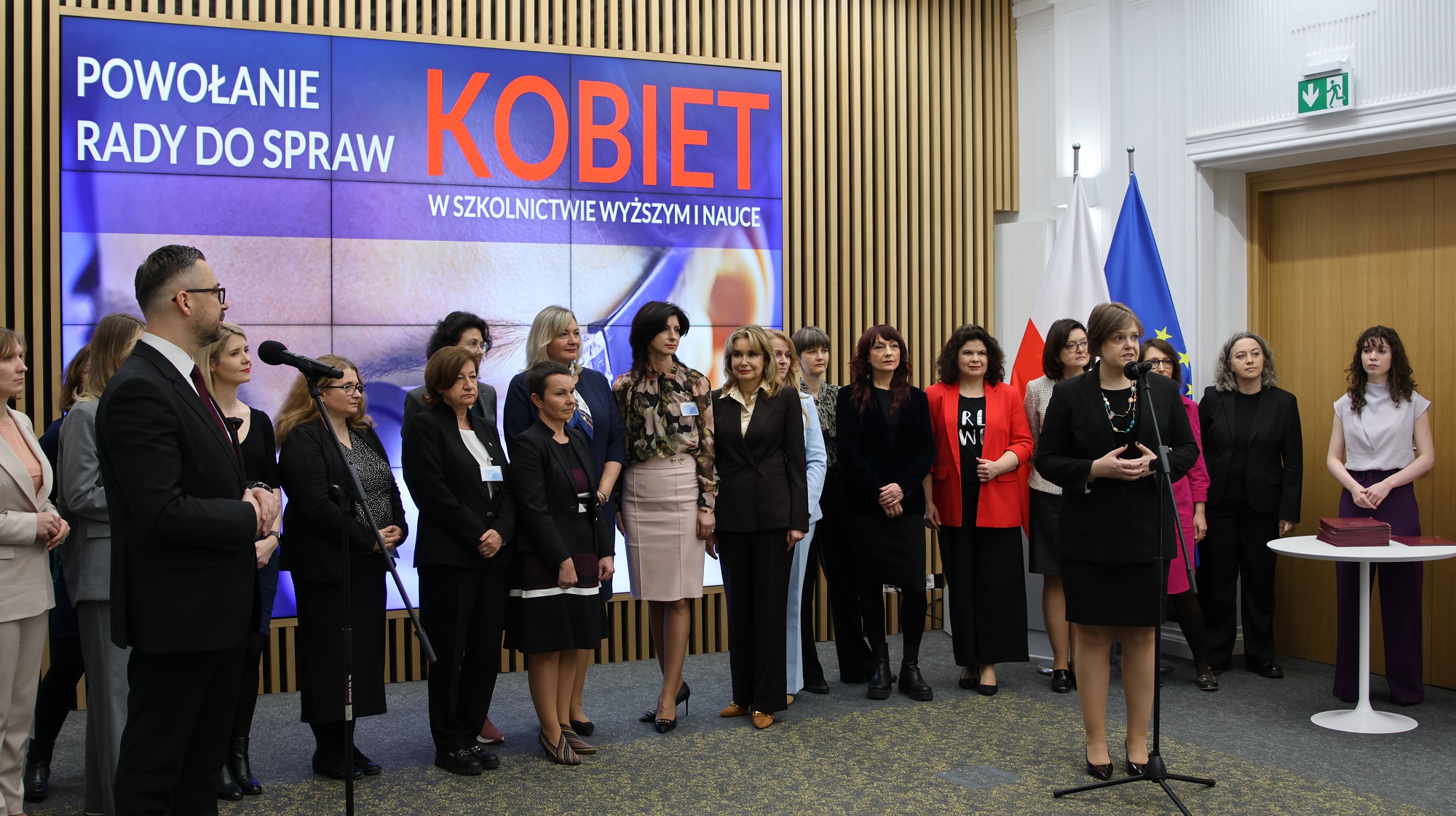‘Promoting and supporting women in science is an important initiative that has a tangible impact on science in Poland, as gender balance ensures a diversity of perspectives, approaches, and methodologies. This approach enriches the educational process and scientific research, and contributes to innovation and improved research quality,’ said Minister Marcin Kulasek.
‘The purpose of establishing the Council is to support the Ministry’s actions for equality, balance, and fair representation of women and men in science and higher education. Both women and men face different barriers. In this team, we want to focus especially on the challenges faced by women working in science and at universities. That is why the Council includes both female researchers and other individuals connected to science. I hope the Council will meet regularly, as we have many important tasks ahead. We must carefully observe various phenomena and events and reflect more deeply on why women are still underrepresented in senior academic positions,’ emphasized Deputy Minister Karolina Zioło-Pużuk.
The Council as a response to inequality in science
The Council for Women in Higher Education and Science was established to support equal opportunities, the development of women’s scientific careers, and the improvement of their working conditions. Its tasks will include identifying priority areas for the Minister in terms of equality policies, reviewing draft regulations and laws prepared by the Ministry, and identifying measures to prevent gender-based exclusion.
‘Supporting women in professional development, including those in science, is especially important because they face numerous constraints imposed, among other things, by society,’ stressed the Minister of Science.
According to data from the POL-on system, only 28% of individuals with the title of professor are women, and in the STEM fields, only 33% of academic teachers are women. The situation at the European level is similar—women make up only 29% of the STEM research workforce. The Ministry aims to address these inequalities through concrete institutional solutions.
Objectives and tasks of the Council
The Council for Women in Higher Education and Science will operate under the leadership of Prof. Anna Pacześniak. The Council’s responsibilities will include:
• analysing the situation of women in science and higher education,
• reviewing draft laws and regulations from a gender equality perspective,
• recommending actions to eliminate barriers and discrimination,
• studying foreign solutions to implement best practices in Poland.
Minister Marcin Kulasek expressed hope that the Council would contribute to improving working conditions for women scientists, fostering their career development, and helping to break the “glass ceiling” in academia.
‘It is with great pleasure that I stand before you today, on the eve of International Women’s Day, to present the appointments to the advisory team—the Council for Women in Higher Education and Science—and to sincerely thank you for accepting my invitation to join the Council, which will be led by Professor Anna Pacześniak,’ said the Minister.
Why supporting women in science is key?
The Minister highlighted numerous barriers faced by women in science, such as rigid hierarchies at universities, condescending attitudes from colleagues, and persistent gender stereotypes.
‘Enduring stereotypes and traditional upbringing contribute to the belief that girls and women are better suited for different fields or career paths than boys and men,’ he noted.
He also pointed out that the presence of women in science can inspire young girls to pursue studies and scientific careers, especially in STEM (science, technology, engineering, and mathematics), where women remain underrepresented.
A step towards equality
The establishment of the Council for Women in Higher Education and Science is an important step toward creating a fairer and more equitable academic environment. The Council’s work is intended to accelerate cultural and institutional change, enabling women to fully realize their potential in science and higher education.
‘Carrying out these tasks gives us a real chance to improve the conditions and quality of scientific work, support the professional development of all researchers, guarantee fundamental rights to all citizens, and bring equal treatment into areas where it has so far been lacking,’ concluded Minister Kulasek.
Two female OPI PIB experts appointed to the Council for Women in Higher Education and Science
NewsOn 7 March 2025, the Polish Minister of Science and Higher Education announced the establishment of the Council for Women in Higher Education and Science. This new advisory body is intended to support efforts to promote gender equality in academia, monitor the situation of women in science, and recommend solutions aimed at improving their working conditions and supporting their scientific career development. The Minister appointed two female experts from OPI PIB to join the Council – Dr Agnieszka Chłoń-Domińczak, professor at SGH and chief research specialist at the Laboratory of Statistical Analysis, and Dr Anna Knapińska, assistant professor in the Data Science Team.
